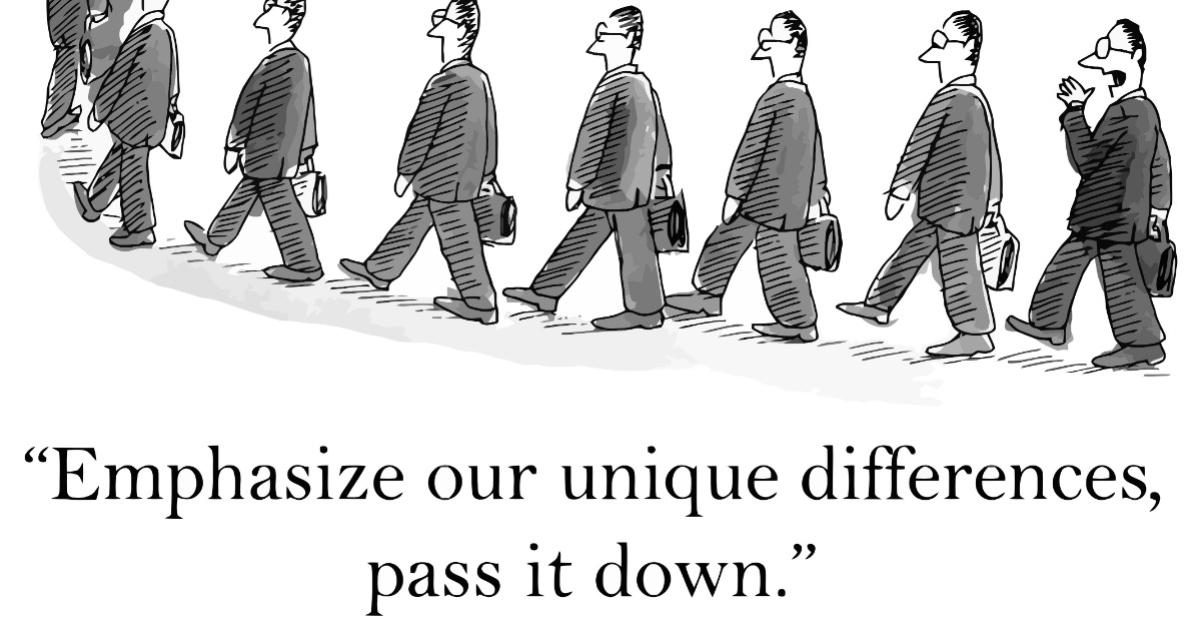
According to Jordan Peterson, left-wing totalitarians are characterized by an ideology in which group identity is paramount. I will demonstrate that this is a misconception. Historically, socialists have fought against feudalism and capitalism in the name of emancipating the individual from any kind of group or class identity. The totalitarian tendencies of socialist thinking stem from its insistence on using the state as an instrument to destroy all group identities and bonds that (allegedly) hinder the individual from becoming truly free.
Identity politics must therefore not be interpreted as an end in itself. In the same way as class warfare was supposed to destroy capitalism and create a classless society, identity politics is supposed to destroy the majority society that treats individuals as members of groups, rather than as individuals, and to create a society without group identities.
In a famous interview on British Channel 4, Peterson was asked to explain the philosophy of left-wing totalitarians. He stated that this
philosophy presumes that group identity is paramount. That is the fundamental philosophy that drove the Soviet Union and Mao’s China, and it is the fundamental philosophy of the left-wing activists. It is identity politics. It does not matter who you are as an individual; it matters who you are in terms of your group identity.
Peterson repeated this interpretation of left-wing philosophy several times before and after the interview, so I think it is fair to take the statement as a correct representation of his viewpoint. He contends that groupthink is the essence of left-wing thinking, which is a misconception. Socialists and left-wingers have always fought against what they saw as the exploitation of man by man. They welcomed the destruction of the estate-based society by capitalism, but then they fought capitalism itself because, in their opinion, capitalism was characterized by the exploitation of the working class by the class of owners, or capitalists.
It is important to understand that the so-called class struggle was not an end in itself. The socialist aim was a society in which exploitation no longer existed and class differences were abolished. In the words of Ludwig von Mises, for Marxists, the class struggle is good because it will “bring about the ‘classless’ society in which there will be neither classes nor class conflicts.”
The socialist approach is suspect not because of its emphasis on classes, but rather because the state became the most important instrument of the class struggle. According to Robert Nisbet, to socialists, the modern state appeared to have an affinity for the emancipation “of innumerable individuals from the often oppressive structures of gild, monastery, class and village community.” According to Nisbet, Karl Marx believed the modern state “represent[ed] the beginning of a human emancipation.”
Furthermore, most left-wingers do not fear the growth of the state. Like Marx, they tend to believe that the state will wither away when the communist society arrives. Nothing could illustrate the role of the state in Marxism better than the following quote by Friedrich Engels, Marx’s coauthor and patron, taken from a letter he wrote to a fellow socialist in 1875:
Since the state is merely a transitional institution of which use is made in the struggle, in the revolution, to keep down one’s enemies by force, it is utter nonsense to speak of a free people’s state; so long as the proletariat still makes use of the state, it makes use of it, not for the purpose of freedom [of its enemies!], but of keeping down its enemies and, as soon as there can be any question of freedom, the state as such ceases to exist. (emphasis added)1
The true danger of left-wing thinking is that the state becomes, in the minds of leftists, a morally omnipotent instrument that helps to bring about freedom by crushing every enemy of freedom. In their view, the growth of the state is tantamount to the growth of justice, equality, and emancipation of the individual. Almost any limitation on the state amounts to a limitation on the means to create a society that is free of oppression and exploitation. Left-wingers are blind to the totalitarian tendencies of a growing state, or they believe that the totalitarianism they impose will only punish enemies of socialism and ultimately will produce freedom.
Identity politics can be interpreted as the modern form of the class struggle. The ultimate purpose of the left-wing agenda is not to create strong group identities or to perpetuate the struggle between different groups. On the contrary, the movements that focus on supporting the rights of marginalized groups, such as women, immigrants, and minorities, arose from the protests against the discrimination of individuals based on their group membership.
As Francis Fukuyama writes, these protests can be explained by the fact that modern democracies such as the United States never live up to their pretension to recognize the dignity of all citizens equally. Instead, “people are often judged not on their individual character and abilities, whatever the law says, but on assumptions about them as members of groups.”
According to the political scientist Wilson Carey McWilliams, leftists demand that modern democracies ensure that natural differences are not held against us. We should not be held back by qualities we did not choose and that do not reflect our individual efforts and abilities. Left-wingers do not want to install and perpetuate groupthink; they want to destroy it, at least in the long run. They recognize “women, racial minorities, and the young only in order to free individuals from these ‘suspect classifications.’“2 Their goal, as noted by Patrick Deneen, is a world that provides “endless possibilities of self-creation.”
The fact that identity politics destroys rather than strengthens groupthink is perhaps best reflected in the growing difficulty its adherents have in even defining groups. If everybody is allowed to self-identify as a certain gender, ethnic group, or minority, independent of any objective criteria, the term “group” loses any clear-cut meaning. A generation of people who choose to identify as something instead of being something—perhaps best identified as “identify-asses”—is not a generation of groupthinkers but rather a generation of individualists who happen to express their individuality in the language of group identities.
To conclude, today’s left-wingers are problematic not because they (allegedly) claim that group identity is paramount. They are dangerous in so far as they do not shrink from employing government power to make their dreams come true. They aim for a world in which the state forces everyone to speak and behave in such a way that no one’s subjective feelings, based on their subjective identity, are hurt.
If this limitless task were pursued resolutely, it would obviously give rise to a totalitarian state. There is indeed a risk that Dr. Peterson will be proved right when it comes to the general verdict on left-wing activists that he presented in his interview with Channel 4: “The philosophy that drives their utterances is the same philosophy that already has driven us to the deaths of millions of people.”
1. I have included the text in square brackets in order to better convey the meaning of the original German text.
2. Wilson Carey McWilliams, “Politics,” American Quarterly 35, no. 1/2 (1983): 19–38, here 27.






